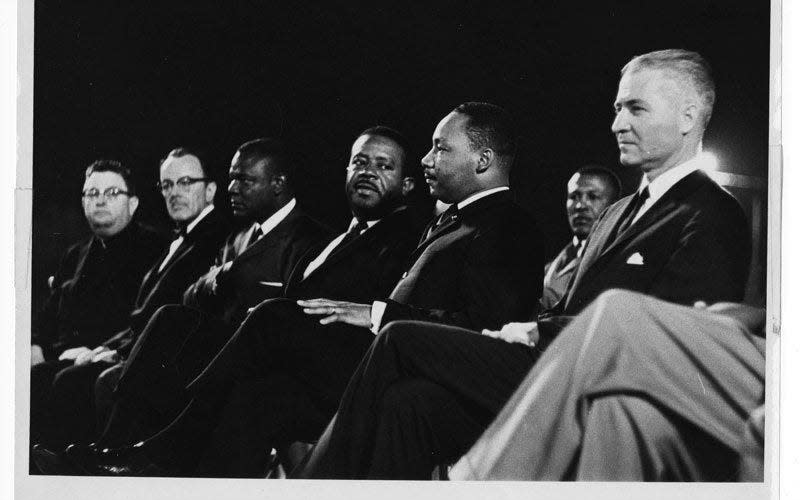MLK's once-lost speech at ASU takes on extra weight, 60 years later

- Oops!Something went wrong.Please try again later.
“We’ve got to get rid of the myth of time.”
Martin Luther King, Jr.
This year is the 60th anniversary of a little-known speech that the Rev. Martin Luther King Jr. delivered at Arizona State University just weeks before the Civil Rights Act was passed in 1964.
“Somewhere, we must come to see that time is neutral,” King said in “Religious Witness for Human Dignity” on June 3, 1964, at old Goodwin Stadium in Tempe. “It can be used either constructively or destructively.
“And I am convinced … that the forces of ill will in our nation have used time much more effectively than the forces of good will.”
His words are as true now as they were then, a sad reality for all to consider at MLK Day events around Phoenix in the coming days.
MLK's message has been largely lost
If leaders and attendees are truly concerned about King’s legacy, instead of just being worried about eating fancy meals and patting each other on the back, they’ll be locked in on making sure democratic ideals prevail since another piece of King’s legacy, the Voting Rights Act, has been dismantled.
“The essence of King’s teachings and what he wanted for us are being systematically lost,” Matthew Whitaker, executive director of the George Washington Carver Museum and Cultural Center in Phoenix, said in a phone interview. He was working as a history professor at ASU when the recording was uncovered in 2013 and was one of the first people to hear it.
“We’ve gotten caught up in the symbolism of King’s message,” Whitaker said. “And I think we’ve cherrypicked aspects of King’s legacy that we feel more comfortable with and affix ourselves to that.”
“People say, ‘Let’s celebrate MLK Day with a day of service,’ which is a good place to start. I don’t mean to minimize that … But King was committed to something deeper and more systemic. That’s what’s off-putting to folks, doing the inner and outer work to be able to change our system to one that is as responsive as it can be to the poor, to the underrepresented.
“I think that’s a real problem.”
We've got chances to seize momentum
There are plenty of opportunities for equal rights advocates to seize momentum.
Project Humanities, an initiative at ASU, is hosting an online discussion on Monday evening about King’s radical push for economic justice and how it was central to his vision of social and racial justice.
The MLK Celebration Committee is hosting a series of events, including a march on Monday morning from Pilgrim Rest Baptist Church, to highlight King’s contributions toward equality.
Add to that a festival in Chandler, a parade in Mesa and awards dinners and speeches from one end of the Valley to the other.
In total, they represent hope that well-connected and everyday people remain ready to heed King’s call.
“Human progress never rolls in on the wheels of inevitability,” King said in the speech archived by ASU historians, a long-lost audio reel that had once belonged to Phoenix civil rights trailblazer Lincoln Ragsdale Sr.
“It comes through the tireless efforts and the persistent work of the dedicated individuals who are willing to be coworkers with God,” King said.
“Without this hard work, time itself becomes an ally of the primitive forces of social stagnation. We must recognize the urgency of the moment. Now is the time to make real the promises of democracy.”
Why voting rights were so crucial to King
These promises include the notion that everyone should be able to cast a ballot.
There was a push for an updated Voting Rights Act that stalled in the U.S. Senate in 2021 and devolved into a pressure campaign aimed at getting Arizona’s Kyrsten Sinema to change her position on a procedural protection known as the filibuster.
Activists have been saying ever since that democracy is at risk. The Jan. 6, 2021, riot at the U.S. Capitol — coupled with fears that Donald Trump has tried to steal an election in the past and will attempt to do so again — have bolstered their position.
But what if all of the MLK Day events in Phoenix, and indeed around the nation, focused on King’s legacy of round-the-clock, grassroots activism?
What's left to say about MLK? Plenty of things
“The systematic attack on the Voting Rights Act began the minute it was passed,” said Whitaker, founding director of the Center for Race and Democracy at ASU.
“But I’m more concerned about the lack of emphasis on community organizing and vote rallying, getting the vote out. I was concerned about the Voting Rights Act, but I was more concerned about getting the vote out.”
It’s going to take everyone, not just Black people speaking to and for other Black people.
King's work takes all of us. We can't wait
King knew this. Racial unity was a theme he touched on throughout his work, especially with a sharp pivot toward the end of his life when he announced the unifying “Poor People’s Campaign.”
He even provided a glimpse of that vision 60 years ago in Tempe. He believed that democracy was a tool to build brotherhood and equality. And he wasn’t willing to give up on the idea.
“I still have faith in America,” he said. “And I still believe that we have the resources in this nation to solve this problem. And I still believe that there is a better day ahead.”
As long as we get rid of the myth of time. As King famously said, “we can’t wait.”
Reach Moore at gmoore@azcentral.com or 602-444-2236. Follow him on X, formerly Twitter, @SayingMoore.
This article originally appeared on Arizona Republic: Martin Luther King Jr. speech at ASU takes on extra weight now

